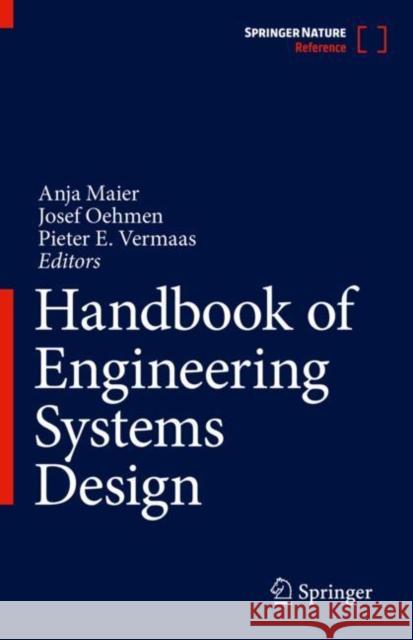Handbook of Engineering Systems Design » książka



Handbook of Engineering Systems Design
ISBN-13: 9783030811587 / Angielski / Twarda / 2022 / 990 str.
Handbook of Engineering Systems Design
ISBN-13: 9783030811587 / Angielski / Twarda / 2022 / 990 str.
(netto: 2683,76 VAT: 5%)
Najniższa cena z 30 dni: 2506,10
ok. 16-18 dni roboczych.
Darmowa dostawa!
Section I. The Engineering Systems Perspective
8. Technical and Social Complexity
Section IV. Reflecting on Engineering Systems Interventions
24. Research Methods for Supporting Engineering Systems Design
Section V. Futures of Engineering Systems Design
31. Educating Engineering Systems Designers: A Systems Design Competences and Skills Matrix
Anja Maier is Professor of Engineering Systems Design and Head of Department Design, Manufacturing and Engineering Management at the University of Strathclyde. She is also Professor at the DTU – Technical University of Denmark, where she has led the Engineering Systems Design research section, conducting interdisciplinary research into designing, building, and operating engineering systems. Linking the human and engineering sides in systems design with a focus on studying and supporting human behaviour, Prof. Maier’s research results have had direct impact on the design and development of automobile and aero engines, healthcare services, medical devices, and cleantech networks. In particular, her work on system design process maturity and capability maturity assessment methods is frequently cited. Prof. Maier serves on the Board of Management of the worldwide Design Society, on the Editorial Board of the Journal of Engineering Design, and as Associate Editor of the Design Science Journal. She is a Member of the International Council on Systems Engineering (INCOSE), a Fellow of the Cambridge Philosophical Society, of the National Academy of Science and Engineering (acatech), Germany and of the National Academy of Technical Sciences (ATV), Denmark.
Josef Oehmen is Associate Professor at DTU - Technical University of Denmark, Engineering Systems Design research section. His research focuses on managing large-scale engineering programs, especially on the management of risk and resilience. He teaches engineering design, project management and risk management at the graduate and post-graduate level. He has worked with over 100 organisations to improve their engineering strategy and execution. Prof. Oehmen is the founder and coordinator of the DTU RiskLab, co-founded DTUs Engineering Systems Design research section and founded MITs Consortium for Engineering Program Excellence. Prior to DTU, he worked at MIT and ETH Zurich, where he also obtained his PhD. Prof. Oehmen led working groups at both the Design Society and INCOSE, and was one of the early drivers behind INCOSE’s and PMI’s ongoing strategic cooperation on engineering program management.
Pieter Vermaas is Associate Professor at the Ethics and Philosophy Department of Delft University of Technology. His current research in philosophy of technology focuses on quantum technologies and design methodology. Research on quantum technologies concern their emergence and impact on society and on our understanding of quantum physics. Research on design includes analysis and validation of design methods within the traditional domains of engineering, product development, and architecture as well as in business, policy, and the social realm. This research builds on earlier analytic projects on engineering and on the concepts of technical artefact and technical function. These projects have resulted in an action-theoretical analysis of the design and use of artefacts, a philosophical account of technical functions called the ICE theory (Technical Functions, Springer, 2010) as well as a textbook on philosophy of technology (A Philosophy of Technology, Morgan and Claypool, 2011) and a handbook with Springer Nature on Ethics, Values and Technological Design (Springer, 2015). Vermaas is Editor-in-Chief of the Springer Nature book series Philosophy of Engineering and Technology.
1997-2026 DolnySlask.com Agencja Internetowa
KrainaKsiazek.PL - Księgarnia Internetowa









